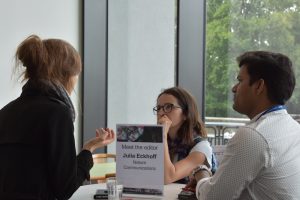10 questions to ask journal editors at conferences

From guest blogger Céline Carret
Senior Editor EMBO Molecular Medicine,
EMBO Press, @EMBOMolMed
At last! You’ve made it to the conference you’ve been waiting so long to attend. It’s going to be perfect – 4 days of great science, poster presentations, socialising and networking opportunities galore. There’s even a ‘Meet the Editors’ session – surely the editors can give you some tips on how to get that paper published that you’ve been working on?
To make sure you get the most out of the opportunity, here are 10 of the best questions I’ve been asked as an editor over the years:
- What do you think of my paper?
It’s true – we want to know what you’re working on! Be prepared to pitch your paper to the editor. Bring print-outs or even show them your paper on your computer. We may not be able to give you the same detailed feedback as in a normal review process, but we can definitely let you know if it’s interesting for the journal or what the missing experiment is that would make your paper stand out.
- Does your journal respect the request for specific referee exclusion?
If there is a conflict of interest with another scientist or you would like to exclude someone as a reviewer for personal reasons, you’ll want to make sure that your dream journal will respect your wish. Depending on the policies of the journal the editor can give you advice regarding how best to approach the issue, and what the chances are of your request being taken into account.
- What is your acceptance rate?

Although the acceptance rate of a journal generally varies from month to month, it’s good to get an idea of your chances of being accepted. In general, competition is high, and perhaps you’d prefer to go for a “safer” journal with a lower impact but higher acceptance rate. The final decision, of course, is yours.
- Do you offer blind submissions so referees don’t see the author’s names?
The idea behind blind submissions is to reduce any chance of possible bias from a reviewer. The practice is becoming increasingly common, and rightfully so! Some journals offer this practice, and some are still to catch on, so it’s worth asking about the policies of the specific journals you’re interested in publishing in.
- What types of studies do you publish?
This question is quite broad, but it gives editors the chance to give you an overview of the various kinds of options you have if you want to submit to their journal, and maybe they’ll give you some new ideas that you hadn’t considered as options previously.
- What do you think of pre-prints and open science?
There are varying opinions on pre-prints and open science publishing, and whether these are really beneficial for the field as a whole. It’s definitely worth talking to an experienced editor to find out their views and tips on whether you should rather wait until the review process is complete or submit your article to a pre-print server at the same time.
- Is your journal open-access?
Theoretically you should have done your research and should know the answer to this beforehand, but perhaps there are some editors at the conference you weren’t expecting. Remember that there are several ways of getting a paper open access, so feel free to ask this to find out what your submission options are.
- How do you handle research integrity issues?
Unfortunately issues relating to research integrity do still exist, and it’s important to find out how the journal deals with these issues should they arise. Editors are generally quite open about this, so don’t be afraid to ask specifics!
- What’s the coolest paper you’ve published this year?

Although they perhaps shouldn’t admit it, editors will have a favourite paper that they are generally more than happy to go on…and on…and on about! So if you want to get them talking, this is the question to ask!
- How can I become an editor?
This career question is one that we are more than happy to answer! Although many editors may have taken different paths to end up where they are, we are all scientists and can provide insight into what life is really like as an editor, and how you can make your way into the field.
So don’t be afraid to approach the editors – we are always happy to give you some tips, and would love to talk to you to find out more!
Meet the editors at EMBL and EMBO upcoming conferences!